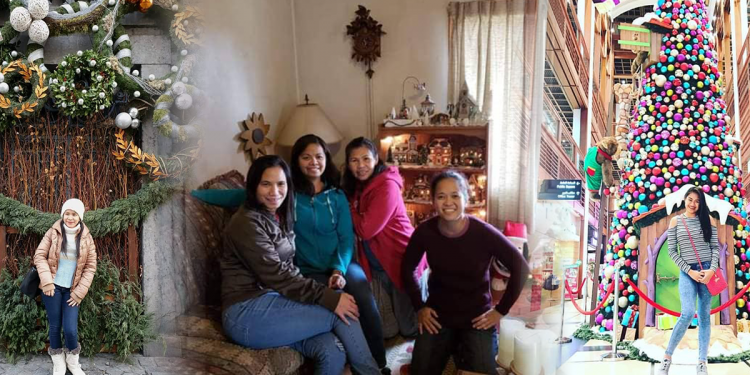Growing up in the Philippines, we have been accustomed in celebrating holidays, especially Christmas and New Year’s in a very special way. Christmas season starts, for most of us, in the first day of “Simbang Gabi,” to Noche Buena, Media Noche and the New Year countdown.
Around the world, every country has its own way of celebrating the holidays, but Filipinos, who are nowadays spreading also in different parts and corners of the globe, have their own little way of spending it with other friends. Here, we have a listed a number of our “kababayans” who are based in different countries around the world and asked them how they celebrate the holidays in their place.
Theresa Pry, a 47 year old Palaweña who’s living in Chadron, Nebraska for fourteen years now, said that New Year’s are considered to be less special in the United States compared to Thanksgiving and of course, Christmas Day. Asked why, she said that they have regular working days during the 31st and usually just have a shorter working hours on the January 1.
“Regular working hours kami during the 31st tapos shorter hours lang sa 1. Kasi alam niyo naman ang America. Not very common ang pag-celebrate ng New Year except siyempre sa mga Pinoy na andito din, talagang iba kapag nasa sarili kang bayan tapos holidays,”Pry said.
The overseas Filipina also said that special holiday in the United States includes the world-known 4th of July, Thanksgiving and Christmas day. But how do OFW’s spend it in the United States?
“Kami dito, usually before pa mag Thanksgiving nagmi-meeting na kami kung kaninong bahay magsi-celebrate, bring and share ng food, pot luck din. Kanya-kanyang dala tapos sharing. But since siyempre ang mga asawa naming ay mga puti, ýung host ng bahay which is siyempre Pinay din , magluluto siya ng mga food like ham or whatever para sa mga asawa naming puti. Ganoon din ang mangyayari kapag Pasko dito” Pry said.
Asked what she missed the most during Pasko and Bagong Taon in the Philipppines, Pry answered litson without any hesitation.
“Litson talaga. Wala kasi kami dito, pero may friend ako na nag-try gumawa talaga pero iba pa rin talaga ang litson sa atin. Sa CA (California) when I lived there, meron talaga silang litson na nabibili very pricey pero siyempre Pinoy ka, papatusin mo ýun kasi it completes the typical Filipino party diba?”Pry said.
Ingrid Loreto, 26 years old, who’s working as an office manager in Abu Dhabi for four years now, said that Filipinos in middle-east countries are usually celebrating with their dormitory friends and roommates during Christmas, but still have regular working hours since obviously they are living in muslim-based countries.
“Naalala ko noong unang taon ko dito, mag-isa akong nag Pasko. Umiiyak ako kasi miss na miss ko pamilya ko,”Loreto said.
Loreto also said that generally she misses her family especially in special occasions like Christmas and New Year’s.
“Pamilya talaga. Kasi sa atin, hindi lang siya holiday, hindi lang siya Pasko, hindi lang Bagong Taon. Reunion talaga. Makakasama mo pamilya mo, dadayo sa mga bahay-bahay ng mga kamag-anak, ganoon. Kahit sinong OFW ang tanongin mo, ang namimiss nila pamilya nila, kahit wala nang pagkain o regalo, ýung makasama mo lang sila, sapat na ýun,” Loreto said.
In Belgium, meanwhile, according to Kathleen Ynzon, a kababayan from Narra town, who’s now living in the European country, said that dueing holiday season, Christmas fares and markets are present in different towns and cities.
“In those places lang maramdaman mo na Pasko talaga. Kasi not every house may Christmas decors. Well, dahil na rin sa weather kasi winter at ibang lahi dito. Unlike sa atin kahit na bahay-kubo may nakasabit na parol. Some people still work until the 24th pero choice nila and if they have to,” Ynzon said.
“After ng Christmas back to normal uli. Next naman is New Year. So in general hindi katulad sa atin na ramdam mo ang whole Christmas vacation mo,” she added.
In Japan, on the other hand, most Filipinos prefer to spend their holidays in famous karaoke bars, according to Arlet Anapada, Palawan State University alumni and now an overseas filipina in the famous home of Cherry Blossom and Mt. Fuji.
“May mga Pinoy dito na nagtitipon tipon sa house ng mga friends kung medyo malaki ung apartment. O kaya sa mga karaoke nag ce-celebrate. ‘Yun madalas ang libangan dito, karaoke kasi dun pwede ka mag ingay at ibuhos stress/pagod mo sa kanta,” Anapada said.
Christmas in the Philippines is a rich mix of homegrown and common Pinoy traditions, a time of hope and new opportunities. For us, the season begins in September, and as December draws closer filipino homes gets brighter.
From “Parols” to Christmas lights, artificial trees, “Karoling”, “Simbang Gabi,” Media Noche and Noche Buena, Family reunions, karaoke boxes, balikbayan boxes, gift givings, litson and of course the beauty of celebrating the holidays with your loved ones, Pinoy holidays are indeed, “walang katulad”.
About 6,000 people leave the island nation each day to seek opportunities across the globe. Filipino seafarers make up about a third of the world’s mariners. One-third of all foreign-born registered nurses in the United States come from the Philippines, and nearly one in four Filipino-born women employed in the U.S. is a registered nurse. Around the world Filipinos are singers, caregivers, laborers, domestic workers, engineers, according to National Geographic.
Whether it may be anywhere across the globe, our modern-day-heroes in general still longs for the tropical Christmas holiday and New Year celebration here in the Philippines.
“Abroad” is a loaded word to Filipinos. Abroad is the people you miss, but it’s also your hope for the future.
Little do our modern heroes know, the family they left home also longs for their presence not just on every holiday, but on every family birthdays, weddings, and other occasions.
Indeed, Christmas Day and the dawn of the New Year will always be significant and special to Pinoys in every corner of the world.



















Discussion about this post